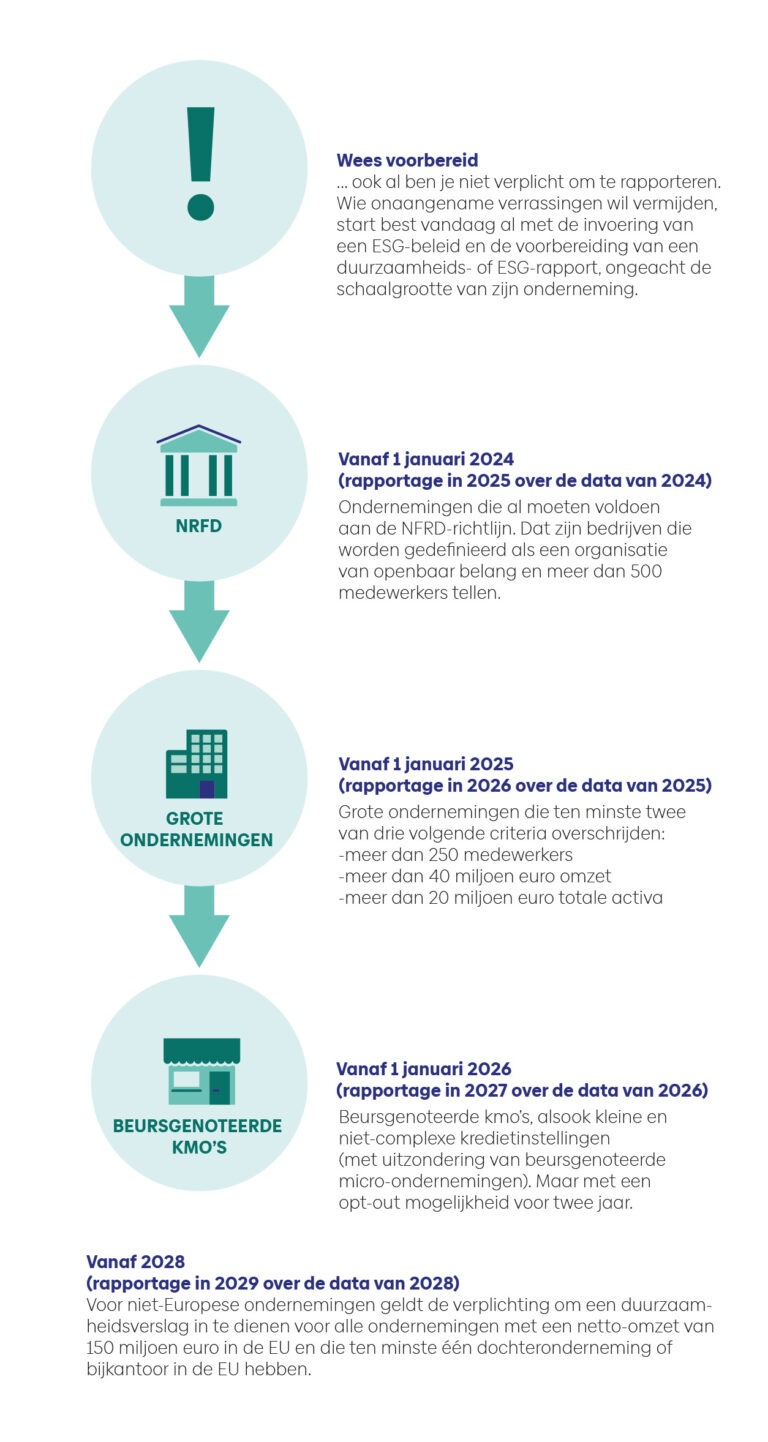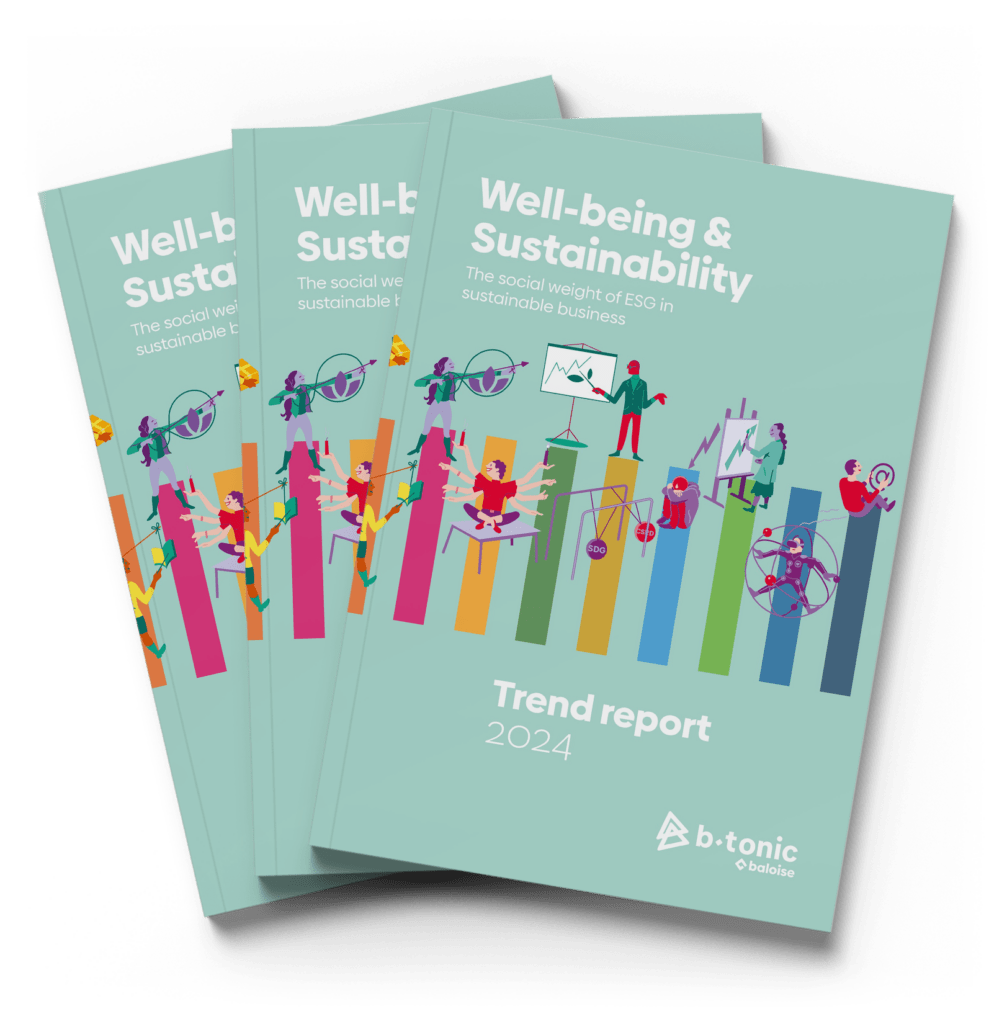Home » CSRD
CSRD
Corporate Sustainability Reporting Directive
CSRD Sustainability Reporting
With the growing attention to sustainability, the Corporate Sustainability Reporting Directive (CSRD) is gaining a central position as a powerful instrument to hold companies accountable for their impact on people and the environment. As a result, companies are compelled to report. In a sustainability report, the company provides insight into its strategy and policies regarding sustainability, how it implements them, and how it performs against relevant performance indicators. Hierbij is duurzaamheid een breed begrip dat veelal ook al in verband gebracht wordt met ESG. But what exactly does CSRD entail?
What is CSRD?
The CSRD, also known as the Corporate Sustainability Reporting Directive, is a European directive that requires companies to prepare sustainability reports starting from January 1, 2024. The purpose of CSRD is to encourage companies to be transparent about their impact on social, environmental, and economic issues. The CSRD addresses three core areas: Environment, Social, and Governance (ESG) What companies need to report on these three pillars is determined by the European Sustainability Reporting Standards (ESRS), ensuring uniform reporting across all companies.
What are the main objectives of CSRD sustainability reporting?
The European Commission has formulated three main objectives of sustainability reporting, and it is important to keep these in mind as you get started with the
obligations of the CSRD:
- Reducing systemic risks of climate change and other sustainability issues such as social misconduct.
- Changes in capital flows: Ensuring that more investment is directed towards sustainable activities and less towards non-sustainable activities.
- Holding companies more accountable for their impact on people and the environment.
CSRD - Who needs to report?
Approximately 50,000 companies in Europe are required to report according to the CSRD. The application fo the CSRD happens in three phases. The scale of your company determines in which phase your company needs to comply with the directive.
For non-European enterprises, the obligation to submit a sustainability report applies to all companies with a net turnover of 150 million euros in the EU and which have at least one subsidiary or branch in the EU.
In Belgium, the companies that must comply with the CSRD are those falling under the provisions of the Belgian Companies and Associations Code. In principle, associations or the public sector do not have to comply with the directive.
The following figure clearly outlines who needs to be compliant and when, once Belgium has transposed it into national legislation in 2024.
When do you need to report?
The reporting obligations under the CSRD come into effect from January 1, 2024, with the first reports due in 2025 for the financial year 2024. The requirements are phased in, with different groups of companies starting to report in different years, depending on their size and market position.
Why do you need to report?
In the Paris Agreement, countries have agreed to limit global warming to below 2 degrees Celsius. A package of measures and policy initiatives, the Green Deal is a collection of rules and ideas aimed at helping the European Union to become climate-neutral by 2050. The CSRD directive comes into play here. This directive aims for companies to take more responsibility for their impact on society and the environment, while also being more transparent.
The CSRD provides you with guidance to harmonize non-financial (also known as extra-financial) reporting, making the information relevant, comparable, reliable, easily accessible, and usable for everyone. At the same time, transparent reporting gives you a basis to measure and report on your achievements and aspirations when it comes to sustainability effectively and consistently. And, where necessary, to adjust accordingly. Last but not least, it provides investors or other business partners with accurate information that they, in turn, can – and increasingly must – use to substantiate their decisions. Finally, it also reduces the risk of greenwashing.
Benefits of ESG reporting
Essentially, ESG reporting enables a company to communicate smoothly and transparently about the social and environmental impacts of its activities and its governance. And that can help to:
- comply with regional, national, and supranational regulations;
- enhance attractiveness for investors, lenders, and subsidizing authorities;
- make sustainable business commitment tangible and underscored (reputation and image building);
- attract investors and customers;
- mitigate the risk of reputational damage;
- employ talent attracted by the company's social responsibility;
- benchmark themselves with competitors or peers in the industry;
- gain better insight into their own competitiveness;
- discover internal growth opportunities (such as cost reduction, circular processes);
- promote diversity and inclusion within the company;
- stimulate the sustainability of its entire value chain (upstream and downstream);
Do you want to know how to approach this best? Read our trend report 2024 for more information.




